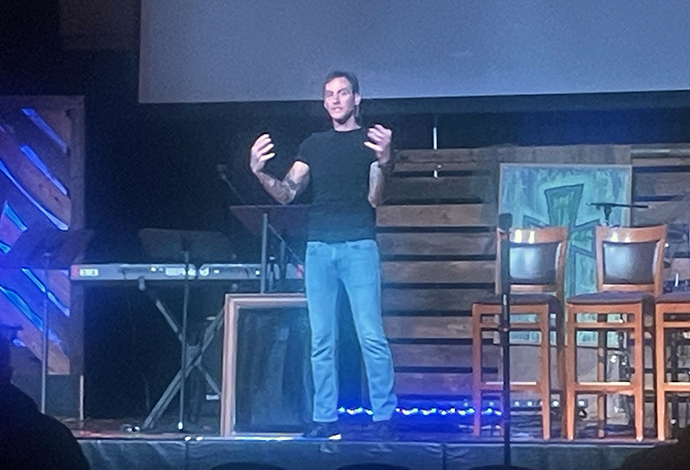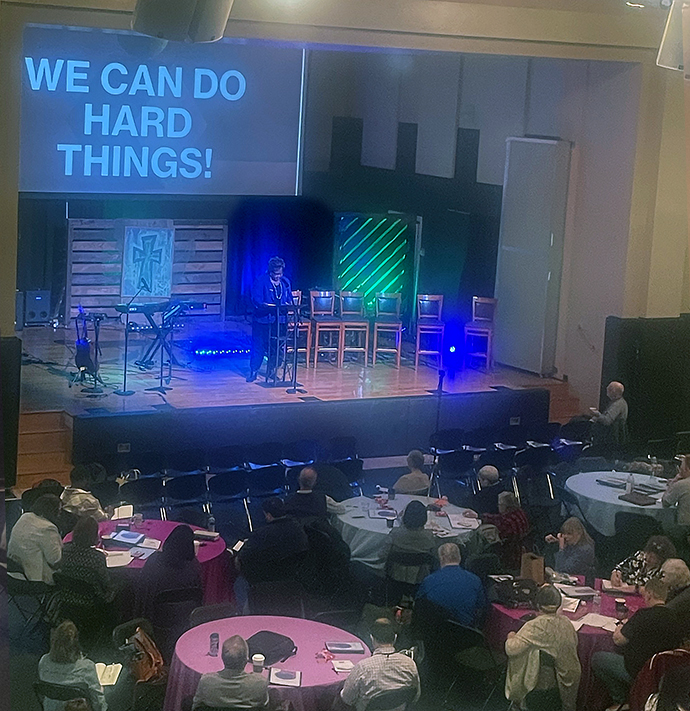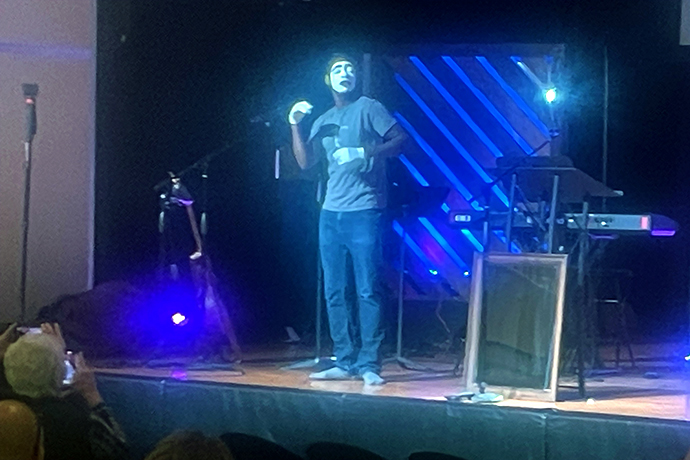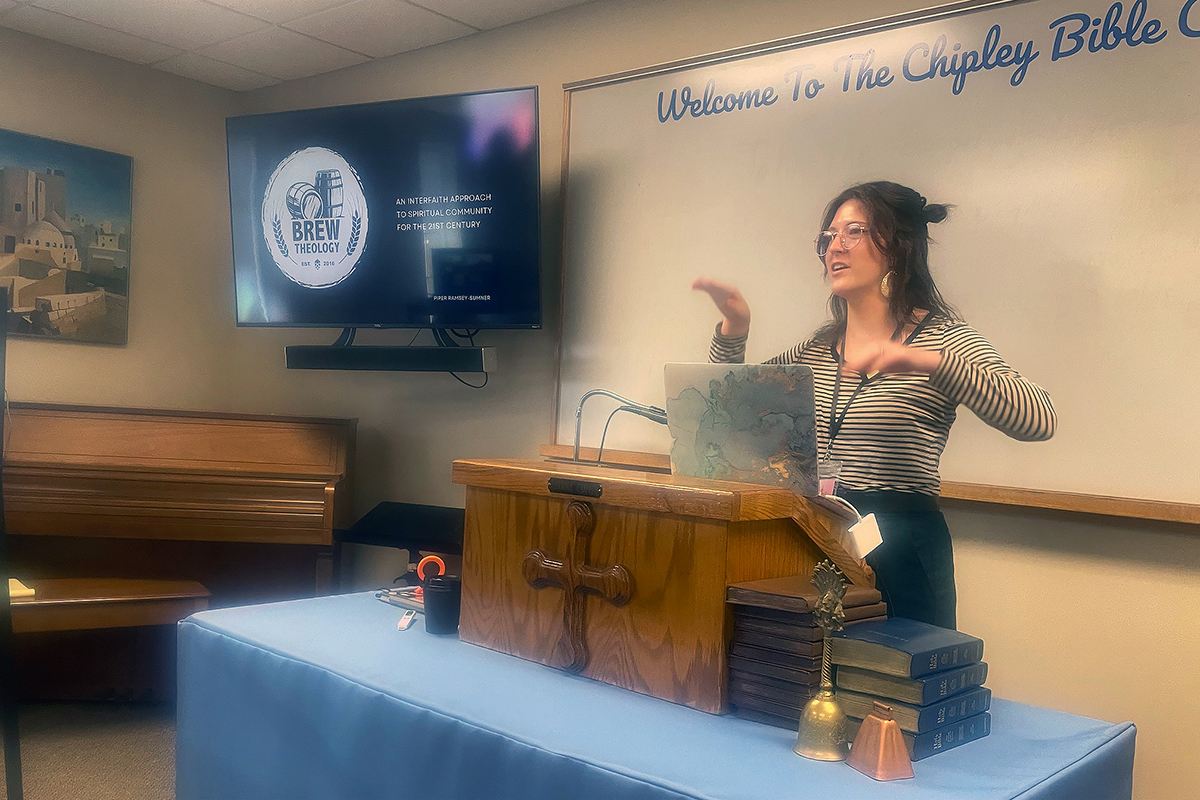Key points:
- The Futuring Forward: The Reawakening of the People Called Methodist conference was held Feb. 7-9 in Charlotte, North Carolina.
- Bishop Tom Berlin of the Florida Conference called Fresh Expressions “the research and development department” of the denomination.
- Informal meetings in brew pubs, coffee shops, campgrounds, private homes and on digital platforms were examined and promoted during the conference.
It sounds strange, but nowadays a brew pub or a website may be a more effective place to seek God than a church.
The stakes to that idea are high for The United Methodist Church, whose membership in the U.S. has been aging and drifting away for decades, along with other mainline Protestant denominations.
“(Fresh Expressions) was born out of this realization that people are not coming to the church,” said the Rev. Michael Adam Beck, who leads Fresh Expressions UM under the aegis of United Methodist Discipleship Ministries and also teaches the concept at United Theological Seminary.
“In (Methodism founder John) Wesley’s day, people were not coming to the church. He writes that ‘they will never step foot in a church, and so we have to go out and we have to be church with people where they are.’”
The Fresh Expressions movement in the denomination offers a viable way forward, said attendees of Futuring Forward: The Reawakening of the People Called Methodist, the first national meeting of the group that explores alternatives to the traditional focus on Sunday morning worship. Fresh Expressions emerged in Anglican churches in England in the early 2000s, and the concept caught on in the U.S.
“All the data shows that young people don’t want to be told answers about their faith,” Beck said. “But they want to ask questions and be curious and figure out who Jesus is.”
Informal meetings in brew pubs, coffee shops, campgrounds, private homes and through digital platforms were examined and promoted during the three-day conference at Providence United Methodist Church.

Bishop Tom Berlin of the Florida Conference called Fresh Expressions “the research and development department” of the denomination in one of nine keynote speeches at the Feb. 7-9 conference.
“Fresh Expressions is a mobile laboratory where Christians do experiments to share the love of Christ with people in their communities,” Berlin said. “Let’s do anything to make it work and to bring healing and the transformation of Jesus Christ into our communities.”
Hardly anyone, even stalwart United Methodists, believes the denomination can have an effective future if current demographic trends continue.
After decades of internal division about the role of LGBTQ people in church life, more than 7,600 U.S. United Methodist churches have disaffiliated over the past four years under a denominational policy that expired at the end of 2023.
Altogether, those exits represent a quarter of the 30,541 U.S. congregations that the denomination had in 2019.
“In 2024, The United Methodist Church must recover our prophetic voice and our prophetic witness or I believe we will risk falling into irrelevance amid our current culture,” said the Rev. Candace Lewis, president of United Methodist-affiliated Gammon Theological Seminary, in her keynote address.
National surveys consistently show declining interest in the traditional mainline church experience, especially from younger people.
“We have an average attendance of 45,” said the Rev. Diana Foster, a participant in the conference and pastor of Kenwood United Methodist Church in Ashland, Virginia. “We’re in this place of, they can’t just sustain as a community generational church. They must reach out to other people if they’re going to do it.”
Foster is one of 450 people, mostly clergy, who registered for the conference — an additional 350 signed up to monitor sessions online. She was looking for suggestions on how to stop the decline and start to grow again.
“The diversity of the (Ashland, Virginia) community is changing,” she said. “They're having a lot of upper middle-class housing, and then there's also some trailer parks. Our people are pretty much rural. They’ve been there for generations.”
Foster said she was looking “to learn what the opportunities are and what other small churches have done that have been successful.”

Various approaches were presented to conference attendees. Among the speakers were the Rev. Mark Vorenkamp, a doctoral student at United Theological Seminary and the founder of Revolution Church, an online-only ministry to LGBTQ+ people; and Piper Ramsey-Sumner, who spoke about her group, Tally Brew Theology in Tallahassee, Florida. Tally Brew Theology holds meetings in different breweries in the city for people wanting to talk about God and theology. Similar groups meet in Waco. Texas; Kansas City and Fernandina Beach, California.
There were also seminars on traditional church activities such as how to encourage giving.
The common link was the absence of the traditional meat and potatoes of the typical Christian weekly worship services and a structure. That doesn’t always mean those aspects don’t exist, just that they aren’t necessary for these outreaches.
“There’s this idea in sociology of the ‘third places,’” said Ramsey-Sumner, also cultivator of Fresh Expressions for the Florida Conference. “You have your first place at home, you got your second place at work. But then the third place, those are … neutral places, where you can be yourself and connect on a horizontal playing field. Things like our community centers and clubs and breweries and coffee shops, public parks, online spaces.”
Many churches function as a third place, she said.
“The church used to be that place, where we have food pantries, have potlucks and after-school programs, concerts and community sings,” Ramsey-Sumner said. “Especially in smaller towns, the church still kind of functions in that way.”
Surveys show 79% of adults in the U.S. believe in God, she said. “But there’s not 79% of our population that’s in church on Sundays, right?” she added.
In Charlotte, there was more diversity than at a typical United Methodist gathering, but white people were still dominant. Tattoos, nose rings and T-shirts of the rock bands Tool and Nirvana were visible. Vorenkamp wore feminine skirts and leggings that contrasted with their full beard.
“I want to … teach other people how to take the concept of my church and turn it into Fresh Expressions so that smaller versions of what I’m doing through my church can exist at affirming institutional churches,” Vorenkamp said. “That core concept of my church is that for many queer individuals who have received religious trauma, the only safe avenue for them is queer-led and queer-focused ministries, where they don’t have to question whether the leader or the other people in the room are affirming of who they are.”
Watch video

Traditional churches will not disappear from Methodism anytime soon, Beck said.
“We believe in what’s called a blended ecology of church, where there’ll be a blend of inherited congregations with Sunday morning worship like what most of us have grown up with, living in a symbiotic relationship with these emerging forms of church — Fresh Expressions, micro churches, whatever,” he said.
Growth is more likely with the Fresh Expressions approach, he said.
“We want to celebrate them equally,” Beck said. “But there's going to be a lot less fully appointed clergy persons that their only job is to oversee a church that has a couple hundred people in it on Sunday morning, because that form of churches is not really connecting and hasn't for a couple of generations.”
How people gather may be shifting, but the basic need for community will always be there, said Bishop Kenneth H. Carter Jr. of the Western North Carolina Conference.
“A few years ago, the Harvard sociologist Robert Putnam wrote about the values of our culture in his work ‘Bowling Alone,’” Carter said in his prepared remarks for a conference keynote speech. “The simple thesis of the book is that more people are bowling than ever before, but fewer people are involved in bowling leagues. We are bowling, but we are bowling alone.”
Individualism is an “obstacle,” he said.
“We really do need each other,” Carter said. “We cannot do it alone.”
Patterson is a UM News reporter in Nashville, Tennessee. Contact him at 615-742-5470 or newsdesk@umcom.org. To read more United Methodist news, subscribe to the free Daily or Weekly Digests.




